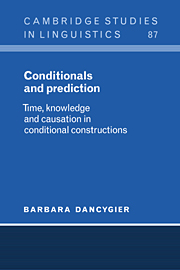Book contents
- Frontmatter
- Contents
- Acknowledgments
- 1 Conditionals as a category
- 2 Prediction and distance: time and modality in conditional clauses
- 3 Relations between the clauses in conditional constructions
- 4 Knowledge and conditional protases
- 5 Conditional clauses: form and order
- 6 If and other conditional conjunctions
- 7 Conclusion: prototypical conditionality and related constructions
- Bibliography
- Index of names
- Subject index
4 - Knowledge and conditional protases
Published online by Cambridge University Press: 22 September 2009
- Frontmatter
- Contents
- Acknowledgments
- 1 Conditionals as a category
- 2 Prediction and distance: time and modality in conditional clauses
- 3 Relations between the clauses in conditional constructions
- 4 Knowledge and conditional protases
- 5 Conditional clauses: form and order
- 6 If and other conditional conjunctions
- 7 Conclusion: prototypical conditionality and related constructions
- Bibliography
- Index of names
- Subject index
Summary
As I argued in the earlier chapters, if as a marker of a conditional protasis instructs the hearer to treat the assumption in its scope as not assertable in the usual way. There are various reasons for the speaker to mark an assumption as non-assertive; most of these reasons, except in the rather exceptional case of commentary on linguistic form, are related to the speaker's state of knowledge. As I have tried to show, the type of unassertability influences the choice of verb forms in the sentence. Thus in predictive conditionals the speaker may mark two different types of lack of commitment with two types of backshift. The if-backshift marks the content of the protasis as in a sense “not knowable” – it is not factual and thus cannot be known to be true or false, and it is also not predictable on the basis of the present situation and its potential consequences. The hypothetical backshift marks both the protasis and the apodosis as even more difficult to assert, because of some other beliefs which the speaker holds. Thus, in hypothetical conditionals, the protasis is still not knowable or predictable, and is then further distanced because of the clash between its content and the content of other assumptions the speaker holds or entertains. The apodosis is then marked with the same distance, for its assertability crucially depends on that of the protasis.
- Type
- Chapter
- Information
- Conditionals and PredictionTime, Knowledge and Causation in Conditional Constructions, pp. 110 - 137Publisher: Cambridge University PressPrint publication year: 1999



